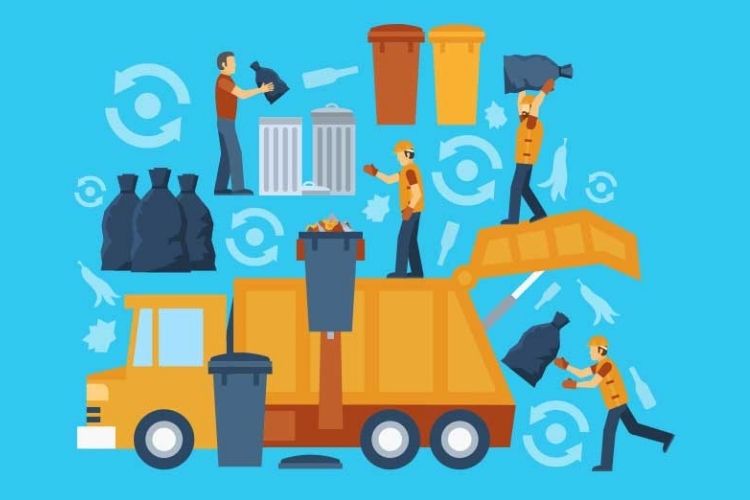Waste source owners, waste treatment owners, the Ministry of Natural Resources and Environment, and the Provincial People’s Committee are responsible for the management of conventional industrial solid waste. Next, LawFirm.Vn will specify these regulations through the 2014 Law on Environmental Protection, Decree 40/2019/ND-CP, Decree 38/2015/ND-CP.
1. What is waste management?
Waste management is the process of preventing, reducing, monitoring, classifying, collecting, transporting, reusing, recycling and treating waste.
Point a, Clause 1, Article 3 of Decree 40/2019/ND-CP stipulates that industrial solid waste is solid waste arising from production, business and service activities, including hazardous solid waste and Ordinary industrial solid waste
Clause 2, Article 3, Decree 38/2015/ND-CP stipulates that ordinary waste is waste that is not on the list of hazardous waste or on the list of hazardous waste but has hazardous elements below the threshold of hazardous waste.
2. Classification of common industrial solid waste
According to the provisions of Clause 12, Article 3 of Decree 40/2019/ND-CP, conventional industrial solid waste is divided into 3 groups:
– Normal industrial solid waste is reused and recycled as raw materials for the production process;
– Solid waste group used in the production of construction materials and site leveling;
– Normal industrial solid waste must be treated by burning, burying, and reconstituting areas where mineral exploitation has ended according to the law on minerals and other treatment methods according to regulations. provisions of relevant specialized laws;
In case ordinary industrial solid waste is not classified, it must be treated according to the provisions of Point c of this Clause.

3. Responsibility for conventional industrial solid waste management
– Clause 13, Article 3 of Decree 40/2019/ND-CP stipulates that regular industrial solid waste source owners are responsible for:
+ Classification of common industrial solid waste
+ Transfer of ordinary industrial solid waste to subjects specified in Clause 13, Article 3 of Decree 40/2019/ND-CP
+ Use the handover record of regular industrial solid waste for each transfer of regular industrial solid waste
+ Self-reuse, pre-processing, recycling, treatment, co-processing, and energy recovery from conventional industrial solid waste must meet technical requirements and management processes according to prescribed requirements. specified in Clause 13, Article 3 of Decree 40/2019/ND-CP
+ Prepare periodic reports
– Clause 16, Article 3 of Decree 40/2019/ND-CP stipulates that regular industrial solid waste processors are responsible for:
+ Have transportation vehicles, storage equipment, and temporary storage areas for regular industrial solid waste that meet the technical requirements and corresponding management processes specified in Points A and B, Appendix III Section III Appendix issued together with this Decree.
+ Ensure systems, facilities, and equipment for conventional industrial solid waste treatment (including preliminary processing, reuse, recycling, co-processing, treatment, and energy recovery from industrial solid waste) conventional industrial waste treatment, hereinafter referred to as conventional industrial solid waste treatment) that meets the technical requirements and management procedures specified in Point C Appendix III Section III Appendix issued with this Decree .
+ In case hazardous waste is generated from a conventional industrial solid waste treatment facility, the responsibilities of the hazardous waste source owner must be fulfilled according to regulations.
+ Prepare periodic reports
+ Implement the pollution control and environmental restoration plan, and notify in writing the competent authority to confirm the completion of environmental protection works for conventional industrial solid waste treatment facilities. Usually within 6 months from the date of termination of operations.
– Article 34 of Decree 38/2015/ND-CP stipulates that the Minister of Natural Resources and Environment is responsible for:
+ Implement state management functions on conventional industrial solid waste management (Clause 17, Article 3, Decree 40/2019/ND-CP)
+ Organize the management and inspection of activities and documents, contracts, and reports related to conventional industrial solid waste processors according to authority.
+ Organize the construction and operation of a national database on common industrial solid waste; Increase the use of information systems or emails to notify, guide, and communicate with organizations and individuals in the process of confirming environmental protection requirements for public solid waste treatment facilities. ordinary career.
+ Organize the implementation of regular industrial solid waste management to serve the preparation and implementation of environmental protection planning according to the provisions of Article 98 of the Law on Environmental Protection.
– Clause 18, Article 3 of Decree 40/2019/ND-CP stipulates that the Provincial People’s Committee is responsible for:
Organize updates to the national database on common industrial solid waste generated in the province; Annually collect statistics, synthesize and update the situation of solid waste generation, management and treatment
normal industry in the locality and report to the Ministry of Natural Resources and Environment for synthesis and monitoring; The reporting deadline is March 31 of the following year.
4. Requirements for conventional industrial solid waste treatment facilities
Article 32 of Decree 38/2015/ND-CP, Clause 15, Article 3 of Decree 40/2019/ND-CP stipulates environmental protection requirements for conventional industrial solid waste treatment facilities as follows :
– Have an environmental impact assessment report approved by a competent authority for investment projects in waste treatment facilities.
– Processing systems and equipment (including pre-processing, recycling, co-processing, energy recovery), packaging, storage equipment, temporary storage areas or transfer stations, transport vehicles Transfer (if any) must meet technical requirements and management procedures according to regulations.
– There are environmental protection works at the waste treatment facility that meet technical requirements and management processes according to regulations.
– Have an environmental management and monitoring program.
– Ordinary industrial solid waste treatment facilities must be certified by a competent authority to complete environmental protection works according to regulations.
– The location of a conventional industrial solid waste treatment facility must be consistent with environmental protection planning and provincial planning.

